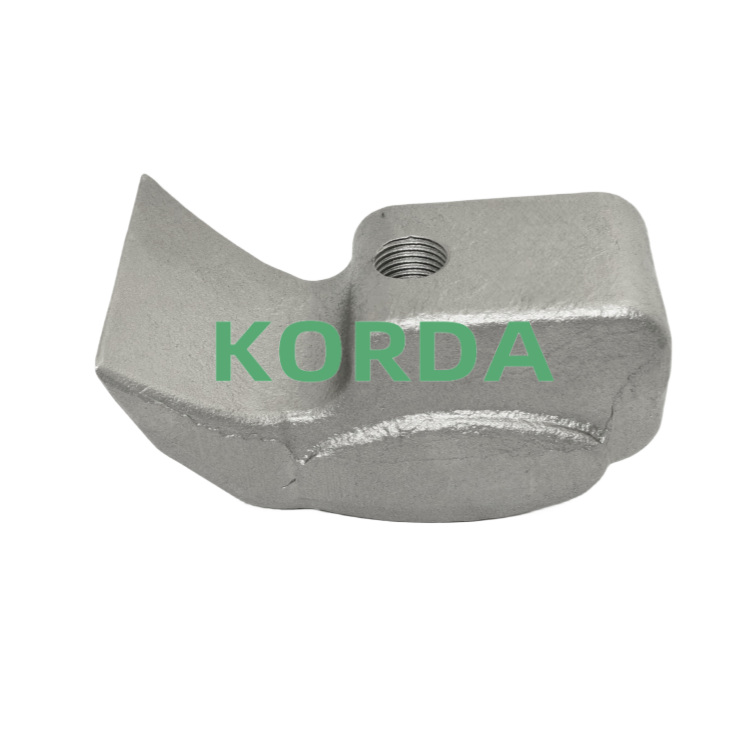Forestry mulcher is the best equipments or forestry machinery for you to make land management, however, forestry mulcher teeth are a critical component of mulching equipment, designed to do with cutting and grinding tasks in demanding environments. Their lifespan can vary depending on several factors, including usage, material quality, and maintenance practices.
Korda machinery, we specialize in providing the high-performance mulcher teeth, like fecon mulcher teeth, fae mulcher teeth, and stump grinder teeth,which are the best tools for your forestry tillers, and forestry mulchers.
Forestry mulcher teeth typically last between 50 to 100 hours under average operating conditions. However, their lifespan can vary significantly based on several factors:
- Material Hardness:
Tough materials (e.g., rocky soil, dense hardwood) may reduce lifespan to 30–50 hours.
Softer materials (e.g., light vegetation) can extend it closer to the upper range.
Usually, Korda use high quality alloy steel and premium tungsten carbide to make the mulcher teeth, which ensures all teeth are in good quality condition.
2.Tooth Quality and Design:
Korda produce the standard tools with the same design from original, which are the best designs.
High-quality carbide teeth may last 200+ hours with proper use and no breakage.
Specialized alloys (e.g., high-chromium steel) and heat-treated blades can further extend durability, with some reports of up to 800 hours.
3.Maintenance:
Regular inspections, cleaning, and timely replacement of worn parts can prevent premature wear.
Proper alignment and avoiding rocks/metallic debris also prolong lifespan.
4.Equipment Type:
Skid-steer mulchers may require more frequent tooth replacements compared to heavy-duty tracked models.
When do you need to replace your mulcher teeth?
Forestry mulcher teeth should be replaced under the following conditions:
- Visible Damage or Wear
Cracks, chips, or breakage: Replace immediately if teeth are physically damaged, as sharpening won’t restore functionality.
Excessive wear: Replace when the carbide tip is worn down or the tooth loses 30–50% of its original length. - Performance Decline
Reduced mulching efficiency (e.g., slower progress, uneven cuts).
Increased vibration or unusual noises during operation.
Overheating or burning smells due to excessive friction. - Maintenance Guidelines
Replace teeth in pairs to maintain drum balance and prevent uneven wear.
Follow manufacturer-recommended intervals (often every 50–100 hours for standard teeth).
Pro Tips:
Inspect teeth before/after each job for early wear signs.
Use high-quality carbide or hardened steel teeth for extended lifespan.
Timely replacement prevents costly damage to the mulcher drum and ensures optimal performance.
Where to buy the right Mulcher teeth?
To select the right forestry mulcher teeth, consider these factors based on industry recommendations and user experiences:
- Tooth Material Options
Carbide Teeth:
Best for rocky terrain or abrasive conditions, offering 2–4x longer lifespan than steel teeth.
Produce finer mulch but are more expensive (e.g., $30–$50 per tooth).
Korda Machinery Tools’ tungsten carbide C3 teeth.
Steel Teeth:
Suitable for lighter vegetation; cheaper upfront but require frequent sharpening/replacement14. - Manufacturers to choose:
Korda machinery provide aftermarket teeth cost-effective replacements, with carbide hammer-style teeth for durable performance,
also, we offer Four-Point teeth systems with planers for balanced mulching. - Key Selection Factors
Compatibility: Match teeth to your mulcher head model (e.g., FAE, Caterpillar, Rayco).

This isn’t just something to read — it’s something to return to, like a favorite place.